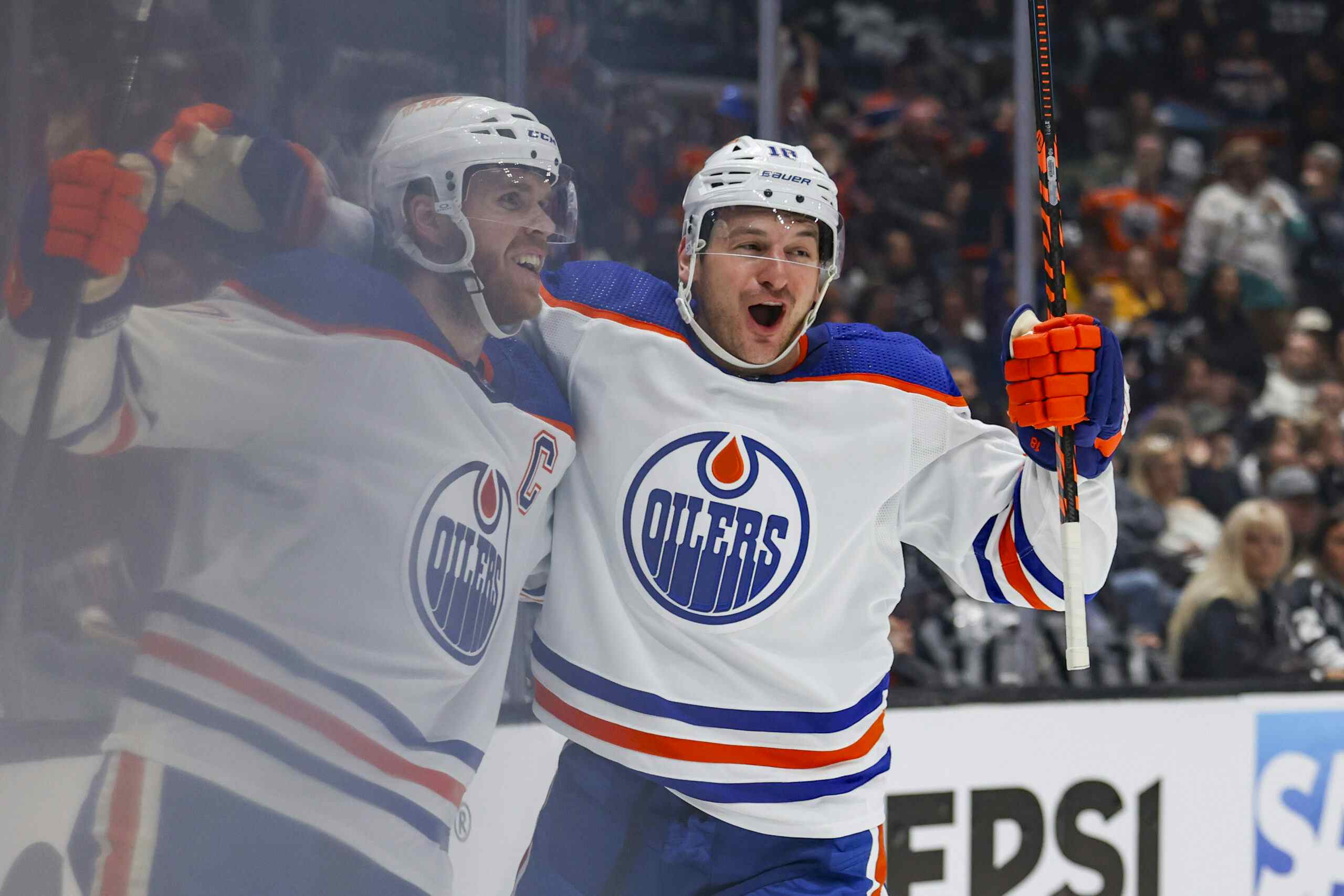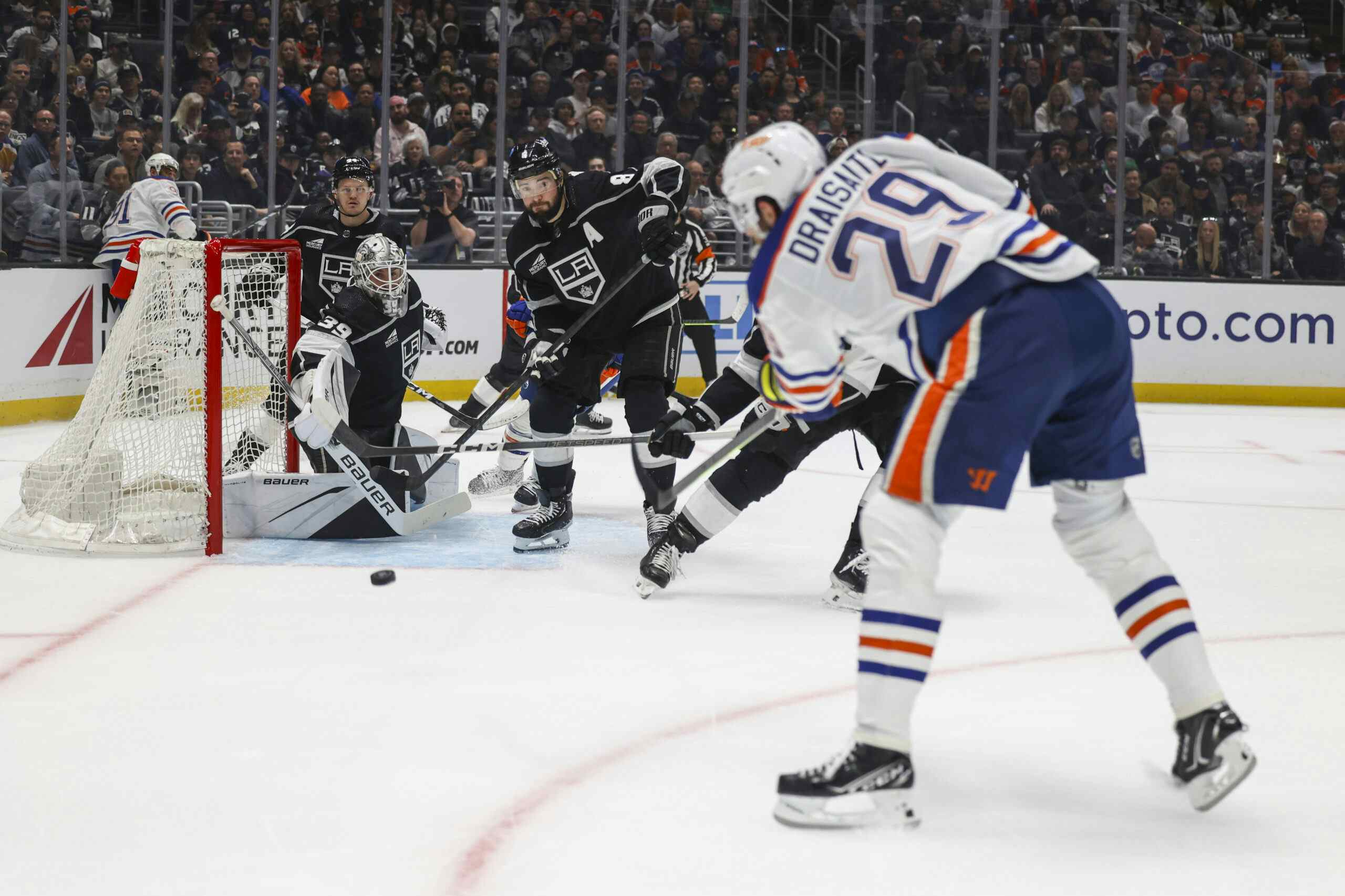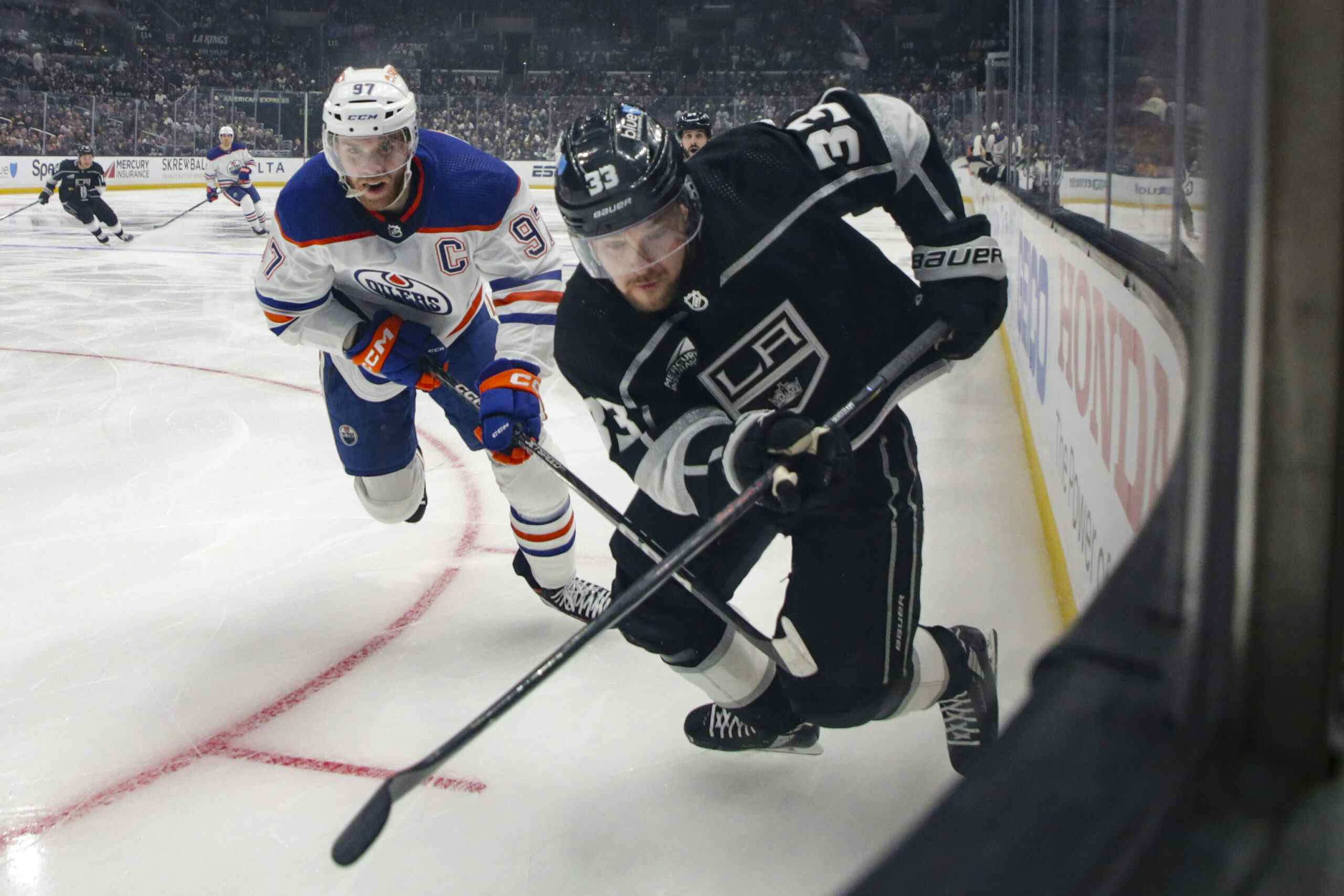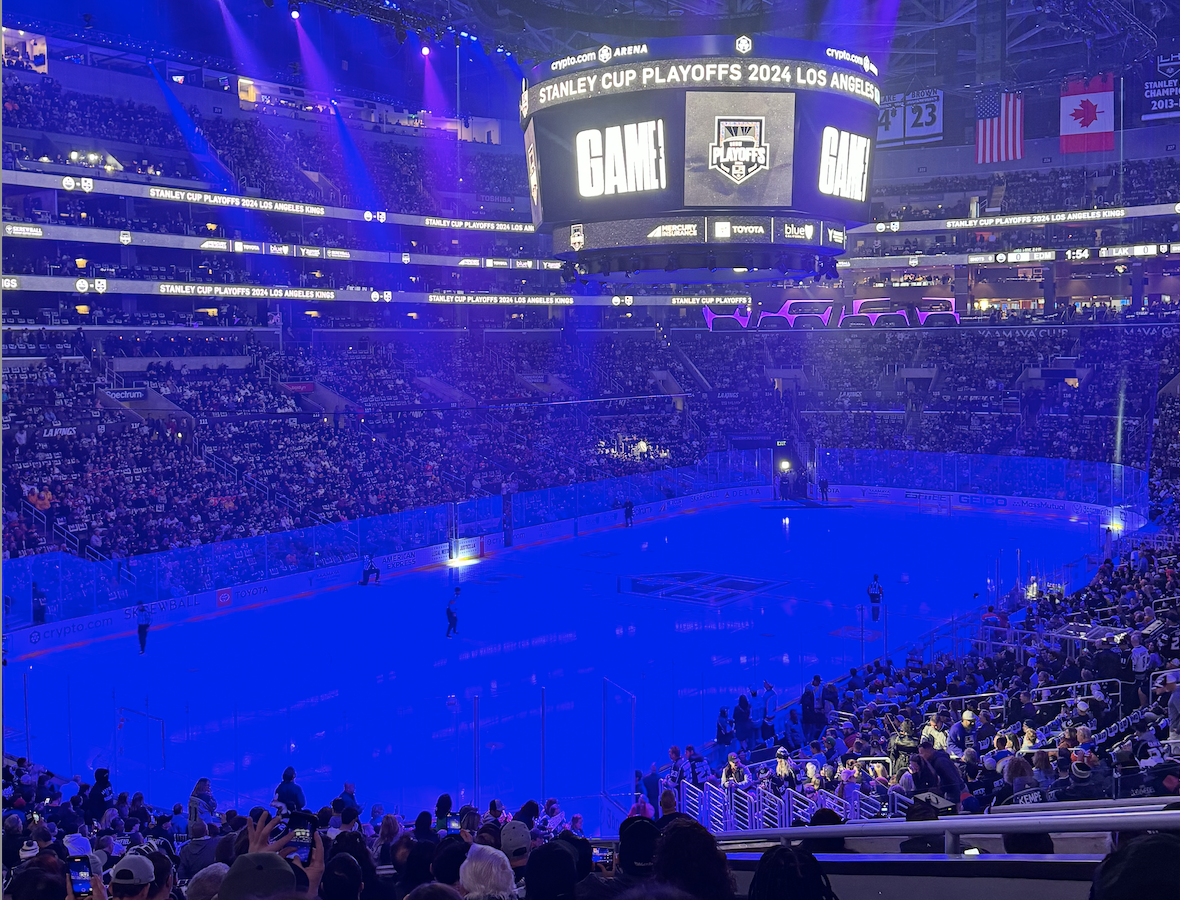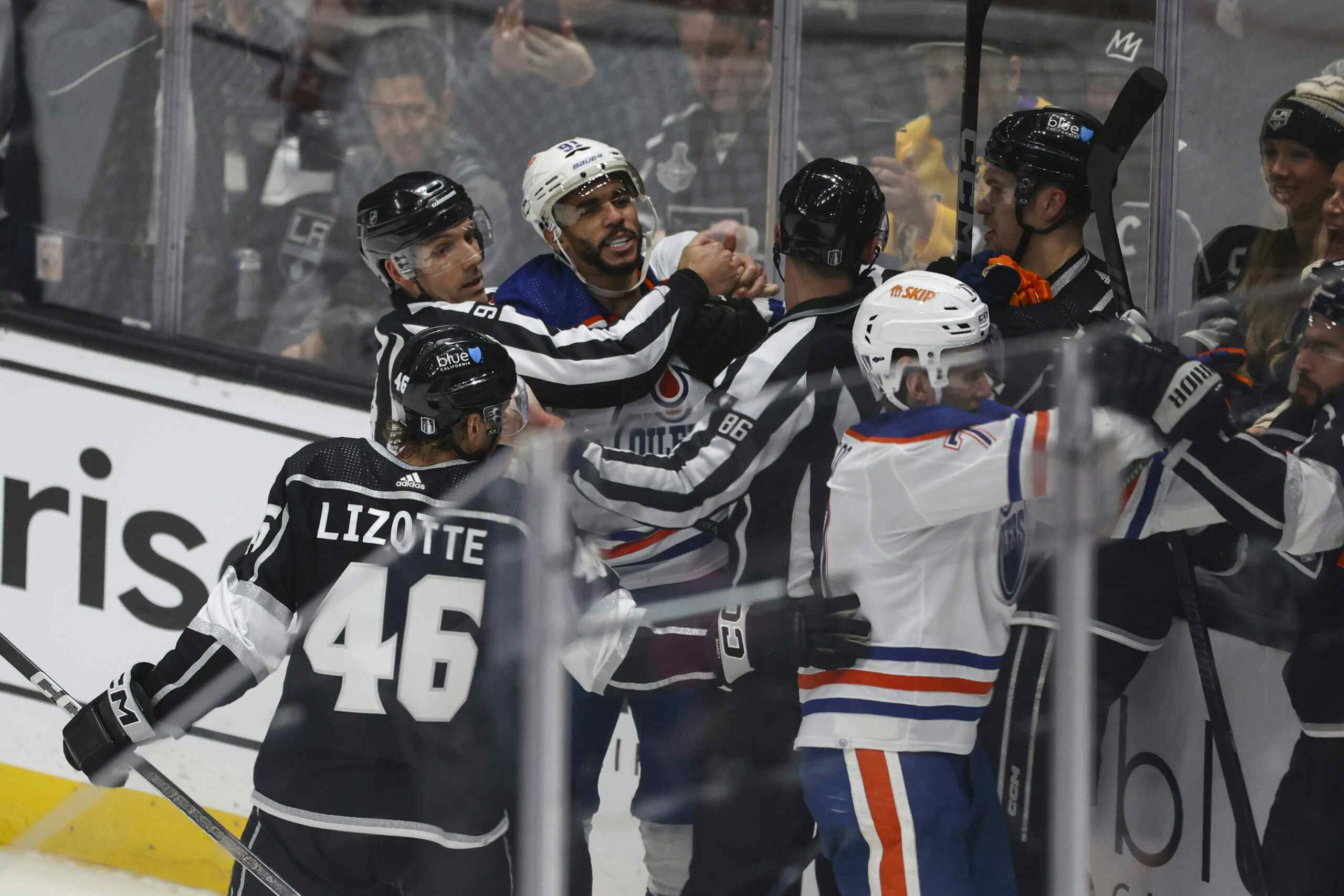AROUND THE LEAGUE: WEEK FOUR
By Jason Gregor
13 years ago
Scott Arniel (Right) and his teammates (R to L) Laurie Boschman, Dale Hawerchuk and Tim Watters were loving life and 7-Up in Winnipeg in the mid 1980s. Fast forward 25 years and Arniel finds himself as a rookie head coach with the Columbus Blue Jackets. He isn’t promoting 7-Up and he’s replaced his teammates with assistant coaches, Brad Berry, Bob Boughner and Dan Hinote. You think the 18, 19 and 20-year-old rookies have pressure in the NHL, imagine being a rookie head coach on a team that has never won a playoff game.
After 730 games in the NHL, Arniel played 530 in the now defunct IHL with stops in San Diego, Houston, Utah and playing his final three years with the Manitoba Moose. He retired in 1999 and became an assistant the next season in Manitoba. After three years he moved to Buffalo to work alongside Lindy Ruff for four years. In 2006, he left Buffalo to become the head coach for the Moose in the AHL.
In four season he went 181-106-33 with the Moose and this past summer he was named the 5th full-time head coach in Blue Jackets history. Gary Agnew (five games) and Claude Noel (24 games) were interim head coaches in Columbus. I caught up with Arniel to find out his coaching influences, philosophies and how he is handling the pressure of being an NHL head coach.
JG: As a player in the NHL way back to your Jets days, was there one coach that was very influential and made you say, ‘that is the kind of coach I would like to be or aspire to be later on in my coaching career’.
SA: You know what, actually when I was playing up until maybe the last couple of years I didn’t want nothing to do with coaching. I think a lot of coaches would probably say that, ex-players would say that. I think what happens is you’re in the game so long that you want to stay in it and your love for the game continues to grow. I mean I had some great coaches. I had Tom Watt there in Winnipeg when I first went there and I had Scotty Bowman, Rick Dudley – I had some real good people who helped me along kind of as a player. But you know what, I kind of think that starts to grow on you and you start to pay attention as you get older and these are some good examples of people that coached me, but I also had some great people that I worked with once I became an assistant coach.
JG: Scotty Bowman, what made him such a great coach in your estimation?
SA: Scotty was a really good judge of talent and a real good judge of his team; especially game day, when the games got going, Scotty could tell who was on and who wasn’t. His ability to adjust on the bench and get the match ups that he wanted, get better players against the other team’s weaker players, his preparation. Scotty was a guy that always lived on the edge. He was always trying to be one step ahead of the next guy when it came to style of play, his thoughts were outside the box , and we know he’s highly involved in a lot of the rule changes over the years and that’s always been Scotty – he really thinks the game, you know he really does get a lot out of his players and he was a good guy to learn from.
JG: Now that you are in the NHL, I hear from a lot of coaches how it’s really changed, and how the human element of coaching is there much more than when you played. Is there a distinct difference in how coaches interact and treat players now?
SA: It’s huge. I think that before it was always kind of a dictatorship where the coaches were the ones that had the hammer and they were the ones that were ‘do it this way, or you don’t play at all’ and as a coach if you didn’t like the player, you just told the GM and you got rid of the guy. Now it’s – certainly with salary cap and these players, the amount of money they are making – just the way the youth of these players, you really have to make sure you are involved with them, that you understand them, that you communicate with them, try to be not an authority figure, but you want to be some sort of a friend. You want to be some kind of a parent with some of these guys, so you really have to get to know them more than just as hockey players.
JG: How do you go about doing that, because you still have to maintain the coaching element, but you kind of have to become a friend where they trust you, especially your first year in the NHL where the stakes are a lot higher, how do you wade through that?
SA: Well the big thing for me is when I talk – you know I phoned all of the players this summer and my first conversations I had with these guys, it started with, where do you live, are you married, you got kids, your parents, siblings – all that stuff. I knew a bit about where they played their junior/college hockey and asked about their experiences there. We talked about maybe some of the guys that have educations, have they continued on. Kind of get it away from the standard hockey stuff that we talk about everyday when they come to the rink. I’ll talk to players about what they’ve done in the past, what do they do with their spare time whatever it might be, it doesn’t always have to be about the game or the game that night or whatever. Sometimes, you just have to get personal with these guys.
I’ve always said to them that the door is open and that if they have a personal problem – I’ve had this in the past where I’ve had players that have lost a parent – if it’s Cancer or some kind of sickness or whatever. I’ve had guys that have had issues off the ice – different things like that. You want them to come to you, you don’t want them to fear you, you want to help them, you want to let them know you are more than just a coach; they’re your friend. You’re trying to get these guys to be the best they can be and if they believe in you, that certainly goes a long way to growing. I think that can be used at any age. It can be used with kids in minor hockey, junior hockey, College hockey or whatever, right up to pros. If the players know that you’re their friend and you have their best interests at heart, then more than likely you’ll get the best out of them and you’re relationships will grow.
JG: You had a unique experience when you were playing – you were a player/coach for one year in 1995/1996 with the Houston Aeros. Did that give you any insight into how you would like coaching and how were those dynamics – being an assistant coach and a teammate?
SA: I really enjoyed it because it was the first time I got involved with practice planning, watching videos, breaking games down, doing scoring chances and helping prepare the games. I didn’t like it because I was a player too and you kinda had to walk a tight rope there. But, it was great experience and it really got me started into going to coaching seminars. I played – I think it was three more years after that, not as a player/assistant coach, I went back as a player for three more years, but all summer I went to coaching seminars and to coaching clinics. I went to listen to other coaches speak and if it was someone I knew, I would ask questions and it really got me started coming down the road to becoming a coach.
JG: You took a unique path with the fact that you were in the National Hockey League as an assistant coach in Buffalo, but left and went to the AHL so you could be a head coach. There is a lot of young guys out there – whether they are in Bantam, Midget AAA and Junior A who are looking to go to the WHL or OHL, they look and say ‘ok, if I go to the next step, I might only get to be an assistant coach.’ Did you feel that your ultimate goal was to be a head coach and the only way to better yourself to be ready to be an NHL head coach, was to do it at a lower level?
SA:I always wanted to be a head guy. I wanted to run my own show and after being a player and my aspirations to make it to the NHL, the same thing happened as a coach. I wanted to be right where I am today and be one of those 30 guys. I phoned almost everybody that I knew in hockey; General Managers and coaches and I asked them all, ‘what is the best way to become a head coach? What is the best advice you can give me?’ It was amazing how different the answers were from NHL GM’s, American League guys, coaches and assistant coaches. 

So, what I found to be number one; Was to be patient. You’ve got to put your time in, don’t try to fast track. What happens with people that fast track, that take one job after another, after another, is that you don’t build relationships, you don’t grow as a coach, you can get caught in the wrong spot, and end up out the door and never have a job again. I think that I knew I had a lot to learn and Randy Carlyle offered me an assistant job after I was done playing to work for him and it was a case that I worked three years with him and really got the feel for what it was like. It was the year we got involved with the Vancouver Canucks and I got to see the other side, what it was like to be with a development team. From there, I had the opportunity to go to Buffalo and work there as an assistant and working with Lindy Ruff and it was a case where I was really learning my trade and trying to do stuff in the summertime to get better, but I knew after working with Lindy that I wanted to be a head coach.
I really knew that’s where I wanted to be. I wanted to be the decision maker at the end of the day. For me to do that, again I asked Lindy lots of advice. I wasn’t going to get that by being an assistant coach in the NHL – it may happen, but you don’t want to get it in the way it usually happens. Where your best friend, who Lindy Ruff was, the guy I admire, I didn’t want him to get fired for me to get my chance as a head coach. So the opportunity to go back to the AHL, which is a very good league to me, was the perfect starting point. It was great family wise, we had a home in Winnipeg, I obviously interviewed for that job a couple times before. For me, it was the perfect scenario – in a great league, great learning league, you could run your own bench, do everything – it really helped me prepare for where I am today. I went through all these different experiences that you really need to do as a coach.
JG: How do you know if you have what it takes to be a head coach? How can you tell if a guy has the dynamics to be a head coach or maybe just be a really successful assistant coach?
SA: You know that is such a great statement there – How do you know you are head coaching material? I think you have to experience it. I think there are guys that are tremendous assistant coaches in the NHL and the American league, and even in junior, that probably wouldn’t have success if they went and took the job as a head coach. Maybe they don’t have the personalities, maybe they don’t want to be the guy that has all the pressure, they may not want to have to live on the edge. You’re always in this business, the hired to be fired scenario, but I think that, for me, it was like I was driven thw same way I was a player to make it to the NHL ever since I was a young kid.
As I continued to coach year after year after year and I’m what, 11 years into it – my desire, my dream was to get to the NHL, to run my own show, to be the boss. Be like Alain Vigneault, Lindy Ruff and Randy Carlyle. Guys I worked with to try to emulate them and do like those guys. And you know what, it’s just part of the drive that’s in you and it’s no different than trying to do anything in life, if you want it bad enough, you go out there and work at it, and I think there’s people that will accept – and it’s no shot to them – some people accept that that’s what they are, an assistant coach. Me, I just felt I was a head coach and once I got to become a head coach, especially in Manitoba, I knew that I could do the job if I put the work and the effort in.
JG: You mentioned you interviewed for the Manitoba Moose job a few times before you got it, and I’m guessing if you’re not a good interviewee you might never get the job. How do you calm down? What tips do you have for coaches when they go through that interviewing process at any level?
SA: Now I think that’s very important, it’s not something that you just wing. That you think about it, that you ask advice, that you ask the coaches that have come before you, if you can – I mean you might be in minor hockey where you may be going before a panel of four or five people that are on a panel. Have an idea maybe of others that have gone through it and maybe some of the questions that are going to be thrown your way. If it’s a junior job, whatever it might be moving up the ladder , be prepared and have an idea of what might be coming from that GM, the style of play. Know the players, know the team. Have an idea, if it’s working with young kids, how you are going to develop your team, how are you going to make it fun for your team, how are you going to teach these guys to first of all – play hard and have fun, but also at the end of the day want to sign up again and have you as their coach the next year.
So, there’s lots of ways you can prepare for it and there’s lots of vehicles out there, lots of books, Hockey Canada, USA Hockey has lots of things that can help you along the way, but don’t just go into an interview and try to wing it. I’ve interviewed coaches, now that I’m a head guy, I’ve interviewed guys as assistant coaches and I can tell there’s guys walking in there just going on reputation, just thinking it would be a walk through and these guys, right from the get go, have shown me that they are not prepared. I’ve had other guys who have come in and just blow the doors off. They were so prepared, were so real as a person, that you really have to take the time and listen. Those are the ones that you interview maybe a second time or third time and get a really good feel for.
JG: It’s very early I know, and you’re off to a good start, but being a former NHL player, has there been anything that has caught you off guard about being an NHL head coach compared to any other coaching job you’ve done.
SA: As a head guy, the pressure to win now in the NHL is absolutely amazing; the pressure from the ownership, the pressure from your fans and obviously the pressure in the dressing room amongst the players. In October, there is no build up, there is no time anymore to get your feet underneath you where you can hopefully be better in November or hopefully be better in December. There’s so many good teams, especially in the western conference. You have to eliminate seven good teams, you have to be on all the time. So, it means that when you come to the rink, your game has to be on, your coaching has to be. You have to make sure you are crossing all the t’s and dotting all the i’s, and making sure the players have all the information they need so that they’re prepared. That is very time consuming and I knew it was going to be that way, but I’ve really been hit here with a big wave of pressure to be in the playoffs. And it’s amazing that you’re talking about that ten games into it, but you’re looking at the standing boards early on. You’re nine, ten games into it; and you’re always looking to see what people are doing.
ICE WOMEN OF THE WEEK
In keeping with our rookie theme I introduce you to two rookies in Nashville. The Predators have the Liquid Ice Girls and the Predators Dancers. Chasity is a rookie Ice Girl, and good news all you smart Internet nerds her favourite show is The Big Bang Theory.

Not to be out done by a Liquid Ice Girl, Tandra represents the Predator Dancers quite nicely.The Dancer’s outfit definitely has more of a Texas feel than the Ice Girls ensemble.

RANDOM THOUGHTS
- Brian Burke ripped Leaf fans this week calling them, okay only the ones who booed Dion Phaneuf, "A disgrace". A touch sensitive are we Mr. Burke? If booing a player is a disgrace, what does he call charging more than $200/seat to watch a 29th place team? Or giving Phaneuf the captaincy when he hasn’t been consistent for two years. Burke and the coaches put all the pressure on Phaneuf by giving him the "C", and with that pressure comes higher expectations from the fans. He should have known that.
- Sidney Crosby had the 5th fight of his career last night, getting a TKO decision over the Stars’ Matt Niskanen. Crosby did pretty well in his first NHL fight back in 2007 v. Andrew Ference. The crazy part was that Crosby dropped the gloves with Ference when his team was leading 3-0. Last night Crosby was annoyed with his Pens’ trailing 4-1, and he took out his frustration on Niskanen. I like it when the superstars drop the mitts.
- After all the great players that came through Edmonton, Raffi Torres of all players became the first former Oiler to score a hat-trick v. the Oilers when he potted three on Tuesday night. It was Torres’ first three-goal game since junior.
- When the Canucks get Dan Hamhuis and Sami Salo back they could have Kevin Bieksa and Keith Ballard in their 3rd pairing. Mike Gillis will have a D-man to dangle at the trade deadline, and unlike last year you have to think the Canucks will try and improve their team via a trade down the stretch.
- Speaking of trades, during the summer I wrote the Flames should consider dealing Jarome Iginla. Many ripped me for that, but here we are a month into the season and many are wondering if the Flames should do it. The Flames aren’t good enough to go deep in the playoffs, so why not deal him and get some youth in the organization?
- Tim Thomas is almost unconscious right now. He is 7-0 with a ridiculous 0.71 GAA, .977 SV%, three shutouts and he has an assist. Thomas has responded incredibly well from the challenge of losing his starting job for the 2nd straight season to Tukka Rask. The dilemma for the Bruins is Thomas’ age and contract. He is 36 and has two more years after this season at $5 million. Rask is an RFA at the end of 2012, so I don’t think they need to make a hasty decision, but you wonder how Rask will react to being second fiddle this year, and possibly next.
- The Sabres are off to their worst start in years at 3-8-2, and you wonder if Darcy Regier or Lindy Ruff will be on the hot seat if things don’t improve. The Sabres were upset by the Bruins in the first round last year becaue they didn’t have enough size and grit, but this off-season Regier did nothing to change that, and now the Sabres are even worse. For years Regier has made very few changes to his team during the course of the season. He believes you pick you team in October and stick with them. He might have to change his thinking if he wants to keep his job, or unless he is prepared to fire Ruff. The latter seems highly unlikely.
- Goes to show what I know. I openly questioned the Thrashers when Craig Ramsey announced that Dustin Byfuglien would play defence instead of forward, despite scoring nine goals for the Hawks during the Cup run last year. Clearly the Thrashers knew what they were doing because Byfuglien leads defenceman in goals, five, and is tied for first in points, 12, with Duncan Keith and Nick Lidstrom. Byfuglien has made the switch back to the blueline look easier than it is. He is playing 22 minutes a night, and with his size, you can expect his minutes to increase.
Recent articles from Jason Gregor

